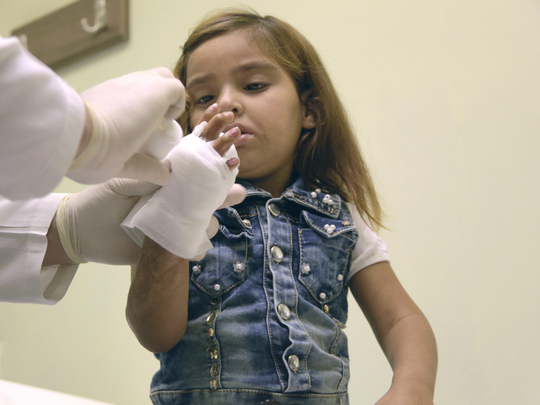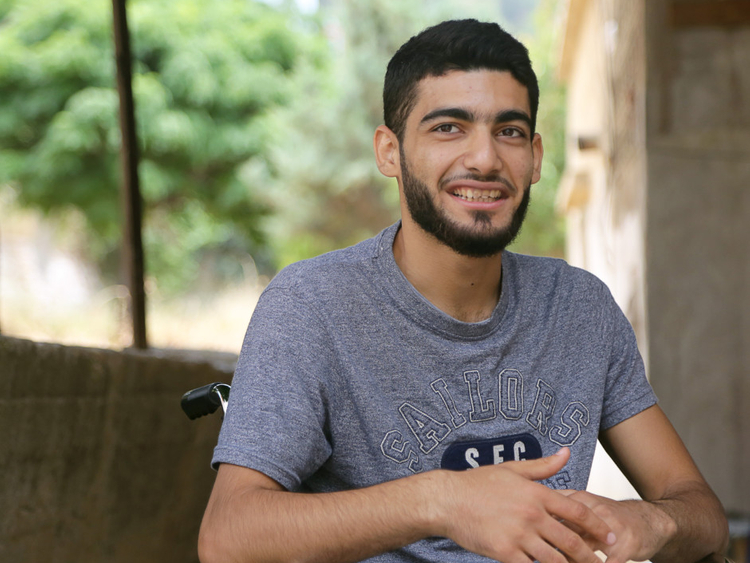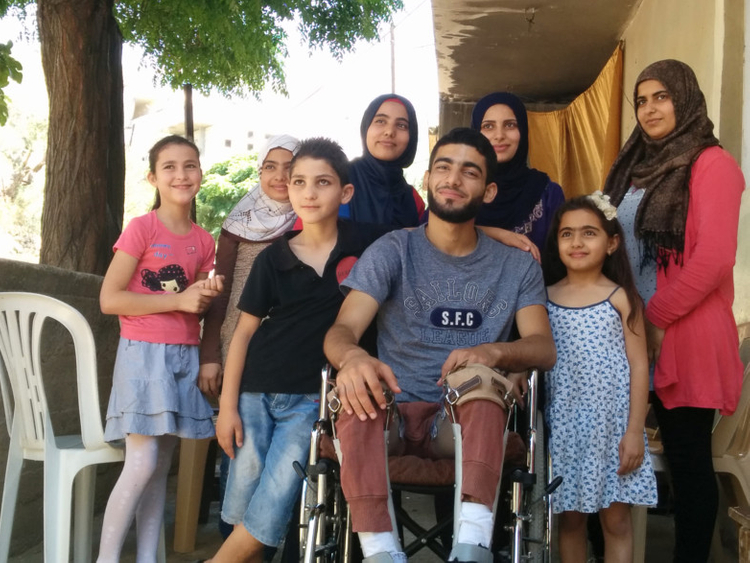
Adnan couldn’t feel a thing. Crumpled under his bicycle, he lay screaming on a street in Damascus, unable to move. The young lad — just 14 years old then — had popped over to the bakery to buy bread for his family when he was shot in the back by a sniper while crossing the bridge on his way back home.
The bullet narrowly missed Adnan’s heart, became lodged in his spinal cord, paralysing him. The boy lay under his bicycle for hours, alone and on the brink of death, until his father managed to reach him amid more sniper fire.
Adnan’s father carried him from paramedics to hospital, and eventually, on a perilous journey from Damascus to Tripoli, Lebanon. There, they moved from hospital to NGO, desperately seeking the medical care that Adnan needed to regain his mobility.
More than a year later, they came into contact with Inara, an NGO that supports children affected by conflict with reconstructive surgery and physiotherapy. It was this small organisation that quite literally helped get the young Syrian’s life back in motion.
“I remember the day I was shot. I remember it well,” says Adnan, now 19, sitting in wheelchair in his garden in north Lebanon.
“It was around six in the morning, I was heading to the bakery to buy bread. I crossed the bridge and saw some military men, so I tried to hide. It was at this point I was shot,” he says. “I fell, but couldn’t feel a thing. I fainted, and when I came to, my bicycle was on top of me and I couldn’t move.”
At first, people could not approach Adnan as the sniper was still watching, firing at those who tried to help. After a few hours, however, Adnan’s father managed to reach him. He took him to a paramedics who cleaned the wound, but he wasn’t able to get to a hospital until the following day.
Despite his grave condition and his young age, Adnan was treated with suspicion by the authorities because he was shot by a military sniper. After spending just a few weeks in a local hospital, his father decided he had no option but to smuggle him out of the country to Lebanon.
Adnan and his father made it to Tripoli, but by this time, his wound had become infected. There, he was supported by an NGO who helped clean his infection and regain the use of his arms. But after a year of physiotherapy, it withdrew the financial support.
Adnan’s family was unable to afford further physiotherapy, but a friend introduced them to Inara. Although Adnan’s paralysis was irreversible, Inara took him in. With intensive physiotherapy and special standing assistance technology, the Beirut-based NGO has given him the chance to live a more independent life.
“Inara works to fill the gaps in medical provision in Lebanon,” says Sophia Karim, programme manager at Inara. “Two such areas that we have seen and are working to cover are that of reconstructive surgery for children who have been injured in bomb blasts or explosions in Syria, and plastic surgery, again for children who are injured in conflict or in the refugee context.”
Indeed, Inara extends help not only to those injured directly in conflict. The NGO, which works in conjunction with the American University of Beirut Medical Centre (AUBMC), often works with children who have experienced trauma as refugees, many of whom have suffered terrible burns due to the overcrowded conditions they live in.
Rouba was just a few months old when her parents took her to Lebanon from Syria after the bombings in Aleppo destroyed their home and killed two of her uncles. Just a couple of months later, living in a cramped apartment in north Lebanon, Rouba fell on a teapot, the boiling hot water scalding her.
“The hot water burnt her chest and leg, so we poured cold water over her body,” Rouba’s father tells us as we sit in the Inara office in central Beirut. “By the next day, the condition of the wounds was very bad, so we took her straight to the local medical centre, but it was expensive and we couldn’t afford it. We then took her to a hospital in Tripoli.”
During her 26-day stay there, the UN helped to pay for her care. After this period, funding was stopped as Rouba’s condition was not critical. Without proper surgery, though, Rouba’s burns would leave her leg permanently deformed.
It was at this point that Inara stepped in. “I got Inara’s number and shared photos of Rouba’s burns with them,” says Rouba’s father. “They were very welcoming. It has been good ever since the first day,” he says, with Rouba sleeping in his arms. “The first time Dr Ghassan examined Rouba, he booked her for surgery [a skin graft]. Thank God, the surgery was successful and now her leg needs some time to recover.”
“When we first saw the parents, they were really desperate,” says Dr Ghassan, surgeon at AUBMC and member of the Inara board. “This was the last thing they needed in a situation that was already difficult. It’s been more than 10 months since we treated her. Her health has improved now that her wounds have closed. But the family still has to live in the cramped space where the accident occurred. This is something that we’re seeing in the refugee population throughout — children coming to us with burns as a result of poor housing and overcrowding.”
Living in similar cramped and squalid conditions in an informal tented settlement in northern Lebanon, young Hassan from Idlib, Syria, was playing with his brothers in their makeshift home when he tripped and fell hands-first into the boiling water his mother was using to cook.
The four-year-old suffered third-degree burns. Hassan’s father rushed him to hospital, but the operation was unsuccessful and his fingers became fused, making simple tasks such as holding things a painful challenge for the toddler.
Once active and sociable, Hassan is now shy and sad. He barely utters a word when he comes to the Inara office and avoids eye contact with everyone. “He doesn’t play with the kids, and he is terrified at the sight of fire,” says his father.
Despite the tragic accident, with the help of Inara and AUBMC doctors, Hassan could regain mobility through skin graft operations. But, as an independent NGO, Inara is reliant on support from donors to fund such cases.
Hassan’s father talks of how this surgery would change his family’s life. “We won’t have to constantly worry about how we’ll be able to raise the money to treat Hassan. We are living under tents, the situation is bad and there’s no work for us,” he says. “May God give support to all those who help my son.”
Like Rouba and Adnan, and scores of other patients that Inara has treated, this surgery could be life-changing for Hassan, enabling him to go back to school, make new friends, and lead as normal a life as possible.
Back in Tripoli, and more than a year after finishing physiotherapy with Inara, Adnan’s spirit is high and he looks to the future optimistically.
“He does whatever he wants now,” says his father. “Before, if he wanted to go out he needed me to help him. Now we rarely see him anymore. He’s always out studying, or fixing phones. At night he always spends time with his friends.”
Since leaving Inara, Adnan has proven that nothing can hold him back. Five years since the incident that shattered his life, he is busy with photography classes, his blog, and planning for his future — he hopes to study electronic engineering at a university. The young Syrian is inspiration personified — he finished third in the Beirut Marathon’s 10K Special Needs Race recently.
As we sit in his garden, he smiles as he reminisces about his homeland, and his hopes for the future of Syria. “I love a lot of things in Syria,” he says. “My school, my friends, my home. Everything in Syria is beautiful. I want to see Syria rebuilt again.”
And indeed, if anyone is proof that this is possible, it is this young man. Adnan has proven that with a little help and support, all is not lost, despite the horrors that the Civil War has inflicted.
“I wish there’s no conflict and that my family could live in peace and stability, without anyone harming us. I hope to return to our country, live there, and see the best for it. The most important thing to do is rebuild our village, to help our friends, the youth, and the adults,” he says.
Faris Al-Jawad is a writer with GN Magazines.
To learn more about Inara and donate, visit www.inara.org














